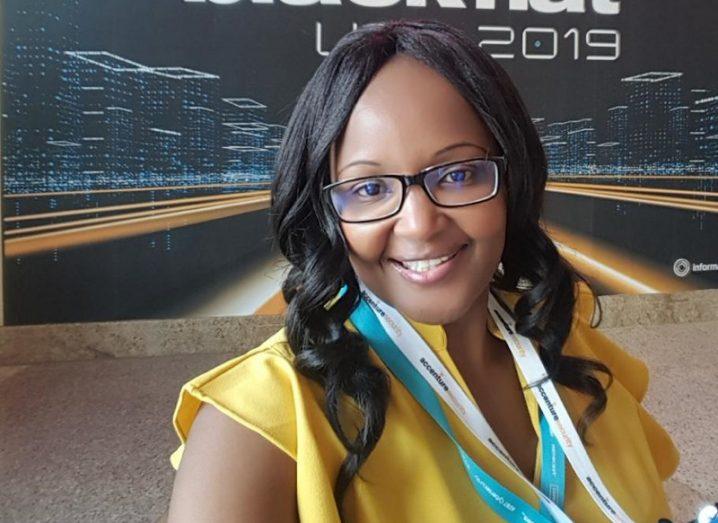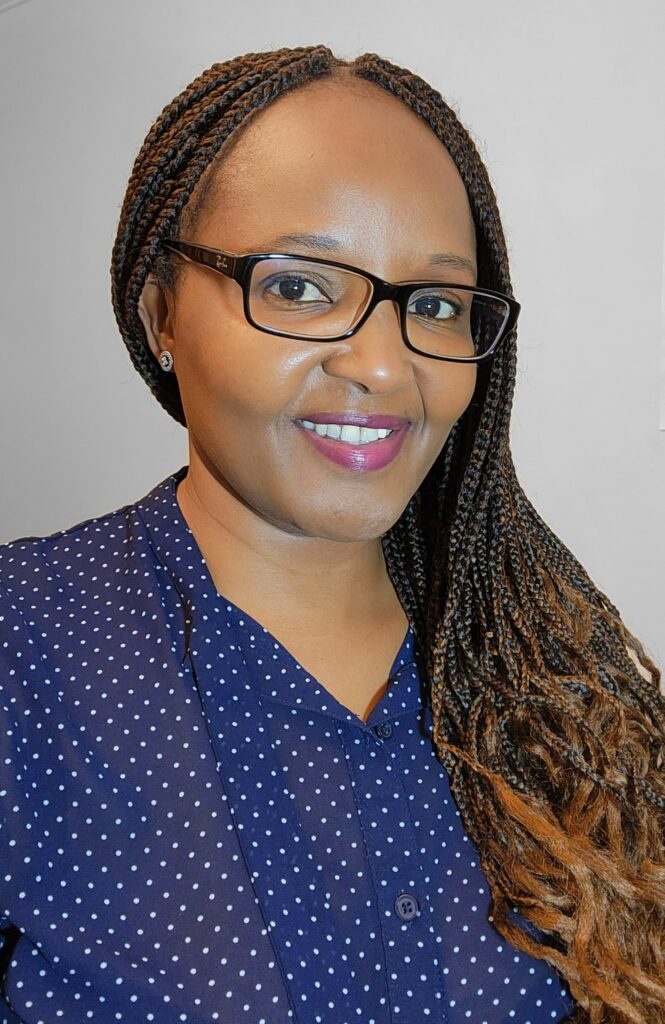advertisement
Just Do It! The Noureen Njoroge Way

Being the Director of Global Cyber Threat Intelligence at Nike, one can only imagine how tough it was to track down Noureen Njoroge, but we managed it. Passionate about cybersecurity, she has built her career with vast experience in multi-faceted, complex, fast-paced environments in the public and private sectors.
She is a strategic thinker with vast knowledge of business management and cybersecurity practices. She has proven leadership experience on issues concerning security and data privacy. Noureen demonstrates consistent client and business success by delivering strategic solutions and applying creativity and judgment, to effectively negotiate mitigation solutions and proactive threats prevention. She has helped and continues to help bridge the gap between those interested in the STEM (Science, Technology, Engineering, Mathematics) field who seek a mentor and those who are experienced in it, through two platforms that she has created to help mentors and mentees connect.
A sitting board member of Women in Cybersecurity (WiCyS), she exudes not only the passion for having a hand in shifting the status quo to include more women in the STEM field, but the commitment to generously share insights on an ongoing basis, and her desire to help clients protect their business and their data in a complex and uncertain world as well.
advertisement
Describe who Noureen is in a minute.
I am an astute problem solver, an effective translator between technical and non-technical entities in cybersecurity, and a people leader. I am a global keynote speaker who thrives in leading high-performance teams and is very passionate about mentoring others and always strive to set an example for others to follow based on hard work and staying ahead of the pack in a rapidly changing industry.
Your parents are qualified engineers. Would you say that was a big influence on your choice of studies/career choice in the STEM field?
advertisement
I had a good upbringing, and I am grateful for that. My parents, both qualified engineers by profession, invested a lot in our education and instilled a never-ending quest for self-discovery and learning. So yes, indeed, they had a profound influence on me. Math and Science were frequent conversations around our home, which did spark my keen interest in the STEM career field.
When did you realise you were passionate about tech and wanted to do this for the rest of your life?
I developed a keen interest in computers, at the tender age of 14. I recall disassembling and assembling my first desktop shortly after receiving it as a Christmas gift. From that moment, my curiosity about tech sparked. Every year, my Christmas and birthday gift wishes were just computer parts, and my family and friends were gracious enough to get them for me. This then became my hobby, and I would eventually assemble a few computers from scratch and donate those to local schools and hospitals in need. I am passionate about helping others and finding great fulfilment in doing so.
advertisement
Your passion for serving and help others, especially from such a young and impressionable age is admirable. Did you have any interest in studying anything outside the stem field before choosing it as your study subject?
Honestly not. My curiosity and passion for computer networking helped me stay focused on the IT industry.
Not many people have the opportunity or even the sheer luck to know what they are passionate about from such a tender age, and then to pursue a successful career in it is rare. How did you get your start in the cybersecurity field?
Curiosity led me to a cybersecurity career. I was that one student who always had questions to ask. When I got my bachelor’s degree in Information Technology, I landed a Systems Admin role. Those late-night shifts at the data centre were the core foundation of my career. I learned a lot. While in this role, I attended a lunch-and-learn session that was hosted by the Infosec team. They shared information on the latest malware trends, tactics, techniques, and procedures used by the threat actors. I was fascinated by the knowledge shared, and I asked so many questions to the point where they offered me the opportunity to shadow the team to learn more. It was this opportunity that deepened my security interest. Later, I was offered an opportunity to join the MIT cybersecurity programme. From the knowledge I had already attained, I knew that cybersecurity would be the future, and I wanted to be a part of it.
This proves that asking can truly lead to receiving. That questioning is a good thing. What are the three things that you enjoy the most about working in the cybersecurity field?
Yes. Always be learning. As a lifelong learner, the ever-changing cybersecurity industry keeps me motivated to keep on learning as there is never a dull moment. With community network and collaboration, I’ve come to know and network with so many in the cybersecurity space which is truly inspiring and encouraging at the same time. It’s a lucrative, rewarding career in pay and compensation though one must play their part in honing their skillset to reap the benefits.
As the Director of Global Cyber Threat Intelligence at Nike, what are your primary responsibilities and day-to-day tasks?
Unfortunately, we are prohibited from sharing such information due to the nature of the work the team does. However, we can document just my title role, and company name. Sorry.
No problem. That is completely understandable. Let’s talk about failure. Failure is inevitable, and I believe that it helps propel us to success and is our greatest learning curve. What has been a failure on your path to your success, (where you are today)?
During my undergraduate studies, I was not wise in selecting my classes. I struggled with poor grades. The first two years were very rough, but I eventually gave up my egotistical “I can do this” mentality and sought career guidance from my professors. It was a journey. I had to reset my mind and follow counsel. I also had to realign my priorities and focus on school which meant long hours of studying. Eventually, my grades began to improve. I kept seeking counsel and finally graduated as an honour student.
“I can do this” mentality and sought career guidance from my professors. It was a journey. I had to reset my mind and follow counsel. I also had to realign my priorities and focus on school which meant long hours of studying. Eventually, my grades began to improve. I kept seeking counsel and finally graduated as an honour student.
How did you deal with this failure and get yourself back to refocus and approach it with a different perspective?
Lessons learned then which I still apply today are:
- Never shy away from asking questions and support
- Be open-minded
- Accept change as part of growth
- Hard work pays
- There are always people willing to help. You just have to reach out and ask
- Failure is just a stepping stone to success
Those are great lessons and advice and can be applied to any situation whether in one’s personal or professional life. Many people, I included struggle with imposter syndrome. What is your approach to dealing with or overcoming it?
Aha! The imposter syndrome! Let me first define it. In a nutshell, imposter syndrome is the state of feeling of a sense of inadequacy that persists despite evident success.
We all encounter such feelings whether we admit it or not in our career journey. Just knowing this is reassuring. No one is alone in this. My advice on coping with or overcoming it, is to first know what your impostor type is. For example, if you are a perfectionist like me, you can practice embracing the fact that things will not always go your way. 100 per cent flawless is not guaranteed. Practice accepting mistakes and viewing them as a natural part of the process which sparks innovation. To echo what Albert Einstein said, “Anyone who has never made a mistake has never tried anything new.”
There will definitely be an increase in “What is my Imposter Syndrome Type” Google searches after people read this article! We know that there are fewer women especially leaders and heads in the tech space. Did this present itself as a challenge to you on your rise up?
Of course, it did have an impact on me especially when I was looking for a mentor. I was surprised to learn there were very few of us in this industry space though I am glad that organisations such as Women in Cybersecurity (WiCyS), which I am a seating board member, are shifting this status quo.
If yes, how did you overcome these challenges?
About overcoming the challenge of finding the right mentor, I kept on networking with others in the industry space and found very valuable mentors. In addition, since I like solving problems, from my experience above, I created two platforms whereby mentors and mentees can connect making it easier for others. All are welcome to join here: LinkedIn Mentoring Group and the Global Mentoring Sessions which occur on the 3rd Saturday every month at 11 am EST.
How can young women combat the challenge of entering the Tech space, especially in leadership roles?
Get a mentor ASAP! Sounds simple but it works. A good mentor can answer those discrete career questions and give specifically tailored advice. They can also see strengths in you that you may not be aware of which if nurtured, can add great value as an advance in leadership roles. Career growth into leadership takes time and thus one must be patient with the process too. “If you don’t ask for what you want or what you need to be supported, you may never know what is possible.” J. Busenbark
Indeed, wise words. Do you have any advice for people entering the cybersecurity profession?
- Be patient with yourself, as it takes time to grasp the vast domains of cybersecurity.
- Embrace change, as this industry is constantly evolving, and you must constantly learn to adapt.
- Get a mentor ASAP to help answer your discrete career questions and provide you with tailored career advice.
- Do not rush into certifications, as they can be costly. Instead, gain some experience, and then consider which specific domain certificate you’d like to pursue, if necessary.
- Network with others in the industry by attending local meetups, chapters, and social media platform group gatherings.
- Lastly, don’t be too hard on yourself. Cybersecurity is indeed a journey, not a destination.
I hope that those who are reading this, are understanding the importance of a mentor. During 2021’s CIO100 Symposium, Standard Chartered CIO Jaine Mwai spoke about the importance of setting boundaries and finding a balance between work and personal life to thrive in both. How do you balance your personal and work life?
I focus on being present whether I am walking, driving, reading working. I focus on that specific task alone. I used to be a multitasker then I realised I was stretching myself so thin I had to change this habit. I have seen great improvement as I can tune out possible interruptions or distractions in my surroundings.
Amidst the chaos of daily life and work, what keeps you grounded?
My faith. It helps me with the power of serenity. “To accept the things, I cannot change. The courage to change the things I can, and wisdom to know the difference.”
What do you do in your downtime?
I enjoy reading hardcopy books that are not security-related, outdoor adventures like bike riding, engaging in community volunteer services and visiting art museums.
This article was first published in the July 2022 edition of CIO Africa magazine.